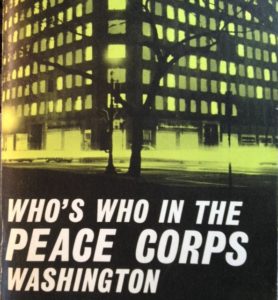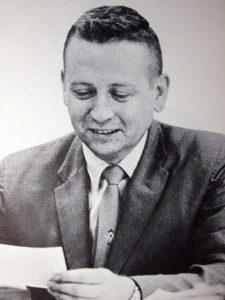John Alexander, Director of the Africa Regional Office
 In 1947, John Alexander followed his graduation from the George Washington University, where he received his degree in economics, by entering Government service. He was promptly sent overseas, the beginning for him of ten years’ uninterrupted activity in the nation’s Foreign Service. Before he returned to take an administrator’s desk in Washington, he had acquire a working familiarity with the overseas side of foreign aid operations.
In 1947, John Alexander followed his graduation from the George Washington University, where he received his degree in economics, by entering Government service. He was promptly sent overseas, the beginning for him of ten years’ uninterrupted activity in the nation’s Foreign Service. Before he returned to take an administrator’s desk in Washington, he had acquire a working familiarity with the overseas side of foreign aid operations.
Starting out as an economist with the U.S. Military Government in Germany, Alexander worked for two years on taxation and budget problems in Berlin and Stuttgart. He was then transferred to the U.S. Commissioner’s Office under the State Department and assigned first to Frankfurt, then to Bonn.
He concluded his German tour with the Economic Cooperation Administration, a predecessor agency to AID, working on problems of occupation costs and the financing of the North Atlantic Treaty Organizing.
In 1954, Alexander was sent half way around the world to Manila, where he was assigned as Chief of the Economic Development Division of the ICA Mission to the Philippines. Working under his direction were fie to seven American advisers to key departments in the Philippines government. Mixed into his Far East tour were assignments as economic adviser and aid program planner in Laos and Korea.
An assignment in the Philippines meant for Alexander a return to familiar country. Ge had been sent there during his three year with the Signal Corps in World War II, a period of service which slice his undergraduate experience into two parts. Although he enrolled at George Washington when the war over, he had previously attended Western Maryland College, where he raced as a varsity two-miler and held national ranking as a college boxer.
Based in Washington since 1957, Alexander was assigned to the development of aid programs for the emerging nations of Africa as the ICA regional economist for that continent. Travel on official missions to Africa at this time presented him with extended, first-hand views of the problems of these new nations.
In 1961, he had become responsible for the U.S. aid program in Nigeria when he was asked by Sargent Shriver to join seven other Government officers on a task force study group charged with launching the Peace Corps.
He joined the new agency shortly after it was organized and was placed in charge of its African programs.
In addition to all that, Alexander is married to former Juanita Shaw Gans of Goshen, Va. and the father of five sons.
“Some students today
are more serious than
any I have ever known
in the past. I have
been amazed at the
hundreds of Americans
kids who have thrown
their future to the
winds in order to go
out and take it on
the chin for the
Peace Corps.”—
Hurst Anderson,
President of
American University
I worked for John Alexander, both as director of the Peace Corps’ Africa programs in 1962, and then latter when he headed PDO/C (1964-65). To my mind, he represented one-half of the unique unique management team Sarge Shriver had put together. On the one hand, Shriver hired charismatic and flamboyant fly-by-the-seat-of-your-pants guys, largely out of the private sector, like Frank Mankiewicz to run Peace Corps programs. He balanced them off with experienced bureaucrats — green eye-shade types from the State Department and AID. Alexander and Warren Wiggins were part of that latter group, and helped to manage the chaos.
When I worked there, it was PDO/C’s responsibility to assign volunteers to the various country programs. Since there were always more requests for PCVs than the available applicant pool, John Alexander thought his job was to identify the poorest PCV assignments and weakest programs in the face of scarce resources. Secretly, he also probably favored teaching assignments in Africa, which he knew and thought were ideally suited to the skills of AB Generalists, the most common type of PC applicant. As a result, his approach really pissed off most of the other regional directors, especially Frank Mankiewicz who articulated a vision about Peace Corps Volunteers’ being the shock troops to help bring about economic justice and reform around the world — especially in Latin America. And for that role, who needed well defined job descriptions? Just pour in the volunteers, and let revolution would follow.
Needless to say, Mankiewicz and Alexander clashed constantly over the allocation of volunteers, and John (and those of us who worked for him) came off looking like unimaginative bureaucrats who couldn’t recognize a creative program or use of volunteers if we saw one. Out of the mix, I assume Shrive got what he wanted, a balance of creativity and flare, while at the same time, an organization where the trains ran on time. David Raphael
I know that Jack Vaughn didn’t like him. I’m told that when Vaughn was made director and went around the building saying hello to people, he said to someone, “I hear that Alexander said with my appointment he was out of the agency.”
“Well,” said Vaughn, “I’m going down to the African Region and tell him he is right.”
It was my impression that, while Shriver was director, John Alexander was part of Warren Wiggins’ team. Warren protected him from the Mankiewicz’ and others he pissed off as PDO/C director. I left the agency in late 1965, while I think Sarge was still trying to run both the Peace Corps and the Office of Economic Opportunity (OEO), so I don’t know anything about the Jack Vaughn era. Maybe Wiggins was gone by then and could no longer protect John. David
I too worked for John Alexander, sort of, my interview with him was arranged by Dick Irish when I came back from Colombia, September 1963, where I served as a PCVL after a stint in Educational Colombia (Colombia XII)I. I had to finish my Masters at Georgetown ,and once I did I went to work for John’s successor Sol Chafkin. I was promptly sent to Graduate School(1964) in Economics at U of MD as part of a National Institute of Public Affairs Program designed to create “clones of Bob Mcnamara, DOD” to be able to improve Planning & Budgeting. After a stint as Paul Sack’s deputy, I took over the central Planning, Program Development & Evaluation job under Jack Vaughn. Great job that included all the tension, aggravation and hostility that John Alexander endured. Too many programs, too few applicants despite the high water mark in 1967 of 15,000 + Volunteers & Trainees.
My interview with John included him getting in my face, very closely, as I recall, & telling me he had no liberal allusions I might have brought with me since he had a brother who had been mugged. I never got a chance to tell him or show him my scars of being mugged while growing up in South & North Philadelphia. Interesting guy and an interview I remember like it was yesterday.
OOPS I GOT MY DATES WRONG. I CAME BACK TO DC IN SEPTEMBER 1965, THAT WAS MY INTERVIEW WITH JOHN ALEXANDER. I FINISHED GEORGETOWN, AUGUST 1966. SEPTEMBER, 1966, I WAS HIRED BY SOL CHAFKIN AND SENT TO THE UNIVERSITY OF MD. ALL THE WHILE I WAS ON PC/W PAYROLL.
If I were to revise the last sentence about John Alexander, it would say, “In addition to all of that, Alexander is married to the former Juanita Shaw Gans of Goshen, Va., and they are the parents of five sons.”
Lots of good memories, with C. Payne Lucas, Walter Carrington, and of course Chafkin who had the first stand-up desk I’d ever seen.
I am Dion Alexander, the first son of John William Alexander from his first marriage to my mother Harriet Alexander (née Flack). I was born in Germany in 1948. My parents divorced when I was very young. I only saw my father once after the divorce when I was in third grade. I would be interested to learn anything else about my father’s life.
I am Blair Alexander, his first son from his second marriage. Please email me at blairalexander@comcast.net or call me at (510) 837-1677. We have much to discuss.